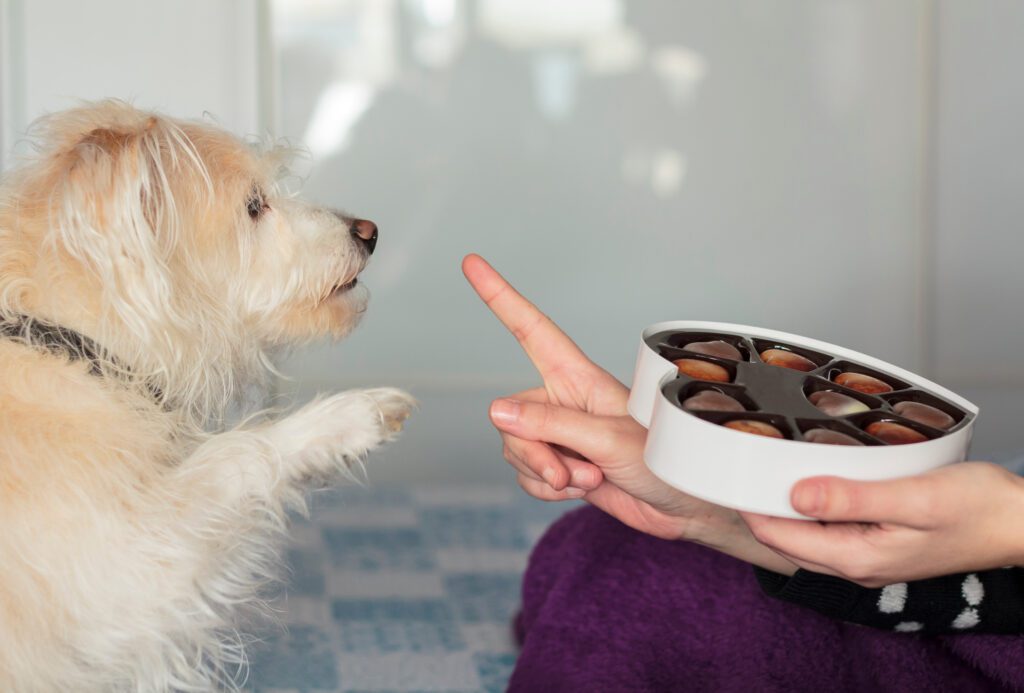Why is Chocolate Toxic to Dogs, and
What are the Signs of Toxicity?
Chocolate is universally known as a “no-no” for dogs, among various other foods that we humans typically enjoy. But why? What exactly makes it so harmful to dogs? In today’s blog, we delve into the reasons why chocolate is dangerous for dogs, and what actions you can take in case your pup accidentally gets into a bowl of M&M’s or a bag of Godiva dark chocolate truffles. Remember, you can call us any time at (918) 665-0508 if you have a question or concern about your pet’s health!

The Toxic Components in Chocolate
Chocolate contains substances known as theobromine and caffeine, both of which are harmful to dogs. Caffeine and theobromine can have similar effects on your dog, but the effects of theobromine last longer. These compounds are easily metabolized in humans, but canines’ digestive systems cannot metabolize them effectively. And the darker and more intense the chocolate, the more toxic it is to dogs, because it contains a higher percentage of chocolate liquor (the liquid produced from ground cacao beans), which contains more theobromine.
Different Types of Chocolate and Their Risks
Chocolate comes in a dizzying variety of forms and flavors, and naturally, some types of chocolate are more toxic than others. A chocolate’s toxicity depends on how much theobromine it contains. Therefore, the darker the chocolate, the more dangerous it is.
White chocolate: Made with cocoa butter, white chocolate is the least toxic, but the sugar and fat it contains can still cause illness in dogs.
Milk chocolate: Milk chocolate contains roughly 10% chocolate liquor and 44mg of theobromine per ounce, making it moderately risky for dogs to ingest.
Dark chocolate: Dark or semisweet chocolate contains about 30% chocolate liquor and 150mg of theobromine per ounce, making it increasingly toxic.
Baking chocolate: Unsweetened or baking chocolate is almost purely chocolate liquor and contains about 50-60% cocoa butter and about 390mg of theobromine per ounce. This makes baking chocolate the most toxic type of chocolate and the most dangerous chocolate for dogs.
Signs of Chocolate Poisoning in Dogs
Consuming toxic doses of theobromine (roughly 9mg per pound of your dog’s weight to 18mg per pound) can cause mild to severe signs, including:
- Diarrhea
- Vomiting
- Muscle tremors
- Rapid breathing
- Seizures
- Rapid and abnormal heart rhythms
In a worst-case scenario, chocolate consumption can be deadly for a dog. Fortunately, most cases are not this severe, but prompt care is absolutely essential to preventing serious illness in your pet.
If your dog just consumed some chocolate, call Animal Emergency Center of Tulsa at (918) 665-0508 to notify our team. We will guide you on what to do next to help your pet. This may involve inducing vomiting (chocolate can take up to 4 days to completely exit your pet’s system) or bringing your pet straight to our hospital for immediate care.
Preventive Measures to Protect Your Dog from Chocolate Toxicity
Prevention is always the best medicine, but accidents can happen! Here are some ways you can further limit your dog’s risk of chocolate toxicity:
- Keep any containers holding chocolate (like a bowl of M&M’s, perhaps) high up where your dog can’t reach.
- Store baking chocolate, candies, etc. in a secure pantry or high-up cabinet.
- When baking, keep chocolate items away from the edge of the counter or table. Once you’re done using the chocolate, put it away.
- Don’t leave chocolate wrappers sitting around. When disposing of wrappers, make sure they’re in a secure waste bin that your dog can’t get into.
- If you have small children, warn them about the dangers of chocolate and make sure they are not eating any chocolate treats around your dog.
- Remind the rest of your family about chocolate toxicity in dogs.
Have More Questions About Chocolate Toxicity? Need Help?
Animal Emergency Center of Tulsa is here for you and your pet when you need us. Your dog’s health and safety are paramount, and we’re happy to provide further resources to help you and your family in protecting their health.
If your dog does ingest chocolate, remember that time is of the essence. Do not hesitate to contact us at (918) 665-0508 for advice or emergency care. Our team is always here to support you and your beloved pet!
